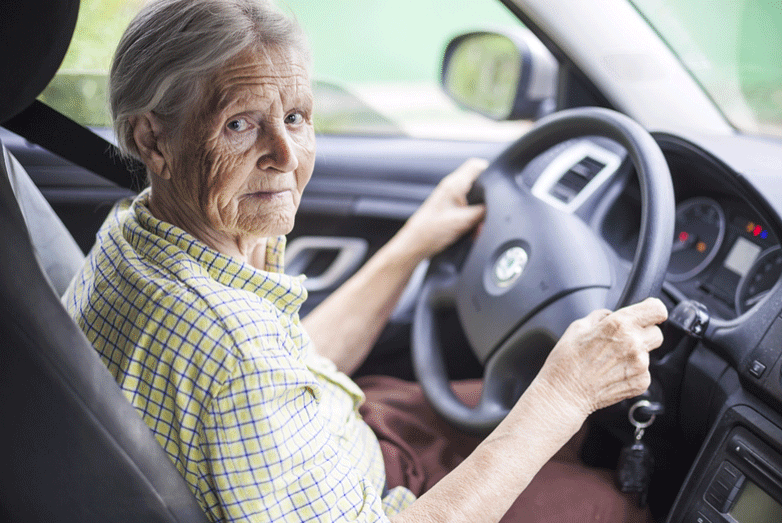Identifying when it’s no longer safe for your elderly loved one to drive is just as important as setting up the proper support systems to help them deal with this serious life change. In the US alone, there are 8.4 million senior citizens that can no longer drive and rely on other people for transportation. This number is only expected to rise. By the year 2030, the number of people over 85-years-old will increase by 4-5 times.
There is no exact age limit that one must relinquish their license. Some elderly people are able to safely drive for longer than others, but fatal crash rates increase significantly for all drivers over 70-years-old.
Reasons that elderly individuals are no longer able to drive include:
-Changes that occur physically and/or mentally.
-Age-related functional declines or the loss of certain skills necessary for safe driving.
-Decrease in driving leads to an overall decrease in the ability to drive.
-Weakened mobility makes it difficult for them to get in and out of the car on their own.
-Taking medications that cause excessive drowsiness.
-Decreased hearing or vision
-Reduced response times
Providing The Right Support Systems
Current automobiles and roadways don’t allow for elderly persons to safely drive themselves. Yet, that doesn’t mean they willingly give up their driver’s license. It’s not easy to relinquish a freedom you have counted on almost your entire life. Try to put yourself in their shoes—would you want to give up your ability to get in the car and go as you please?
Without proper support it is common for elderly people to experience emotional, psychological, monetary and social loss due to a revoked driving license. They may also feel a loss of social status and purpose. You can help make the transition easier for your loved one by providing fundamental support. Beneficial support systems include:
-Find your loved one alternative transportation so that they can continue doing what they like.
-Enroll them in physical therapy or some sort of exercise group to help regain some mobility and prevent a faster decline.
-Relocate your loved one to a place where transportation is more readily available to prevent isolation, loss of purpose or loneliness.
How Do You Know When Your Elderly Loved One Shouldn’t Drive Anymore?
There are a number of signs you need to be on the lookout for in order to stop your loved one from driving before they hurt someone else or themselves. Take the time to ride along with your relative to see if you notice any of the following signs.
-They get lost driving through areas they are familiar with or have been to a lot of times.
-They won’t drive without someone else in the car, and if they do they become lost or disoriented.
-They lose their car in parking lots.
-They are involved in an accident.
-They struggle pulling in and out of parking spaces.
-They have difficulty dealing with glare associated with oncoming headlights, streetlights, etc.
-They ignore important issues with their vehicle, such as deflated tires. Did you know low tire pressure is a leading cause of accidents?
-They have decreased strength when it comes to quickly turning the wheel in the instance of an emergency.
-They are struggling to comprehend street signs and light signals, or simply ignoring them all together.
-They are so stiff that it decreases their ability to quickly turn their head or neck while driving.
-They take a while to notice (or don’t notice at all) pedestrians, bicyclists or other motorists.
-They are not judging distance between other cars appropriately.
-They are easily angered or frustrated
-They are not yielding to other cars that have the right of way.
How To Talk To Someone About Giving Up His or Her License
If you are noticing some of the signs outlined above, it’s time to have a talk with your loved one about giving up driving. Yet, you’ll want to proceed with utmost compassion. Discuss the associated dangers, not only to them but also to everyone else out on the road. Explain that you don’t want anything bad to happen to them.
Explain that he or she will save money every month not paying for a car, gas, insurance, repairs, etc. Insurance can be especially expensive for elderly drivers.
If your loved one remains obstinate about it you may need to contact the DMV. They will have you fill out an online form requesting that a relative take a driving test to see if they still qualify to drive.
Finding Alternate Transportation For Elderly Patients
Just because an elderly person can’t drive anymore doesn’t mean they don’t still have needs for transportation. Stellar Transportation specializes in non-emergency medical transportation for elderly patients of all mobility types. All of our staff undergoes senior sensitivity training in order to provide a safe, comfortable and enjoyable ride. We help take the disappointment out of no longer being able to drive, as we strive to provide the best ride in town, every single time.

